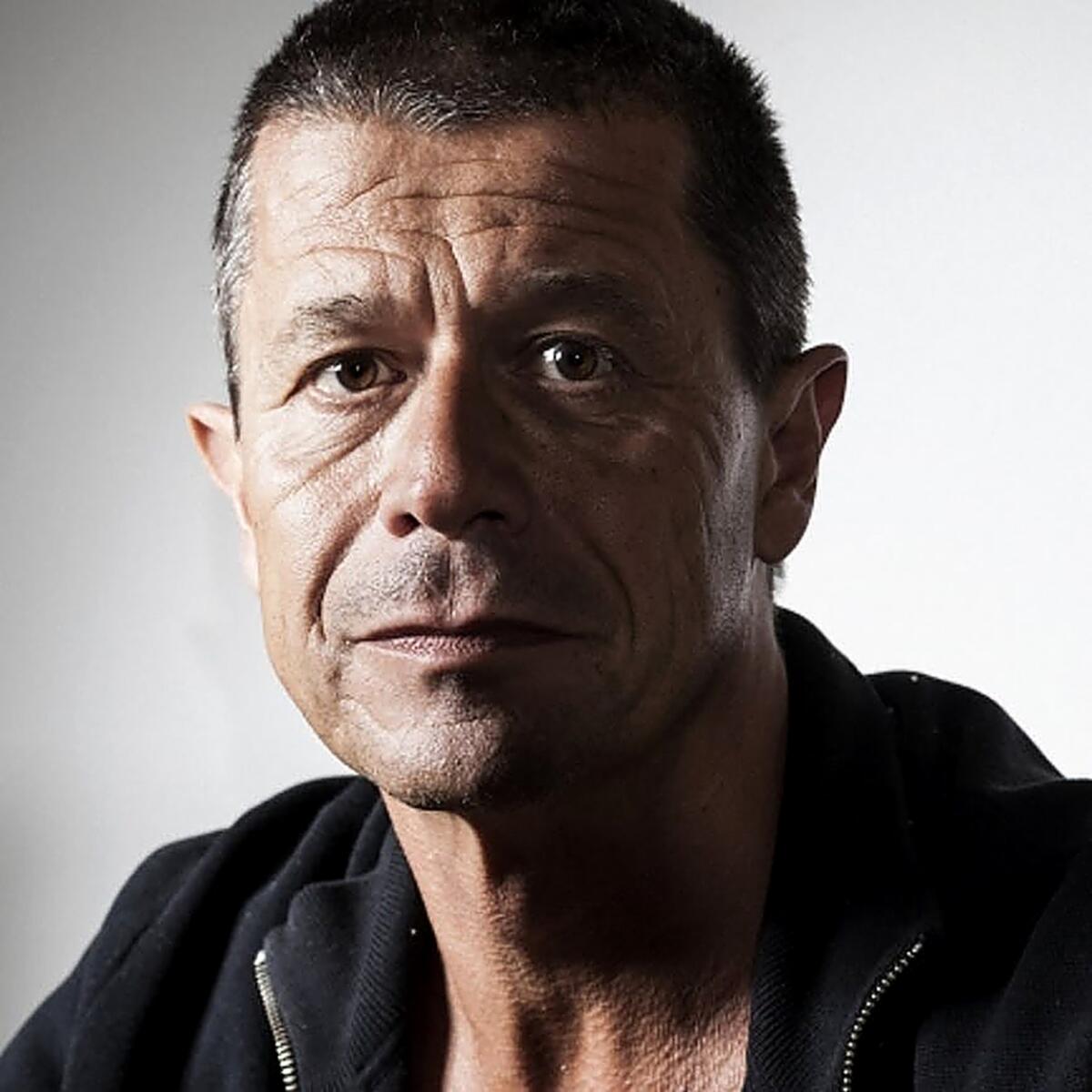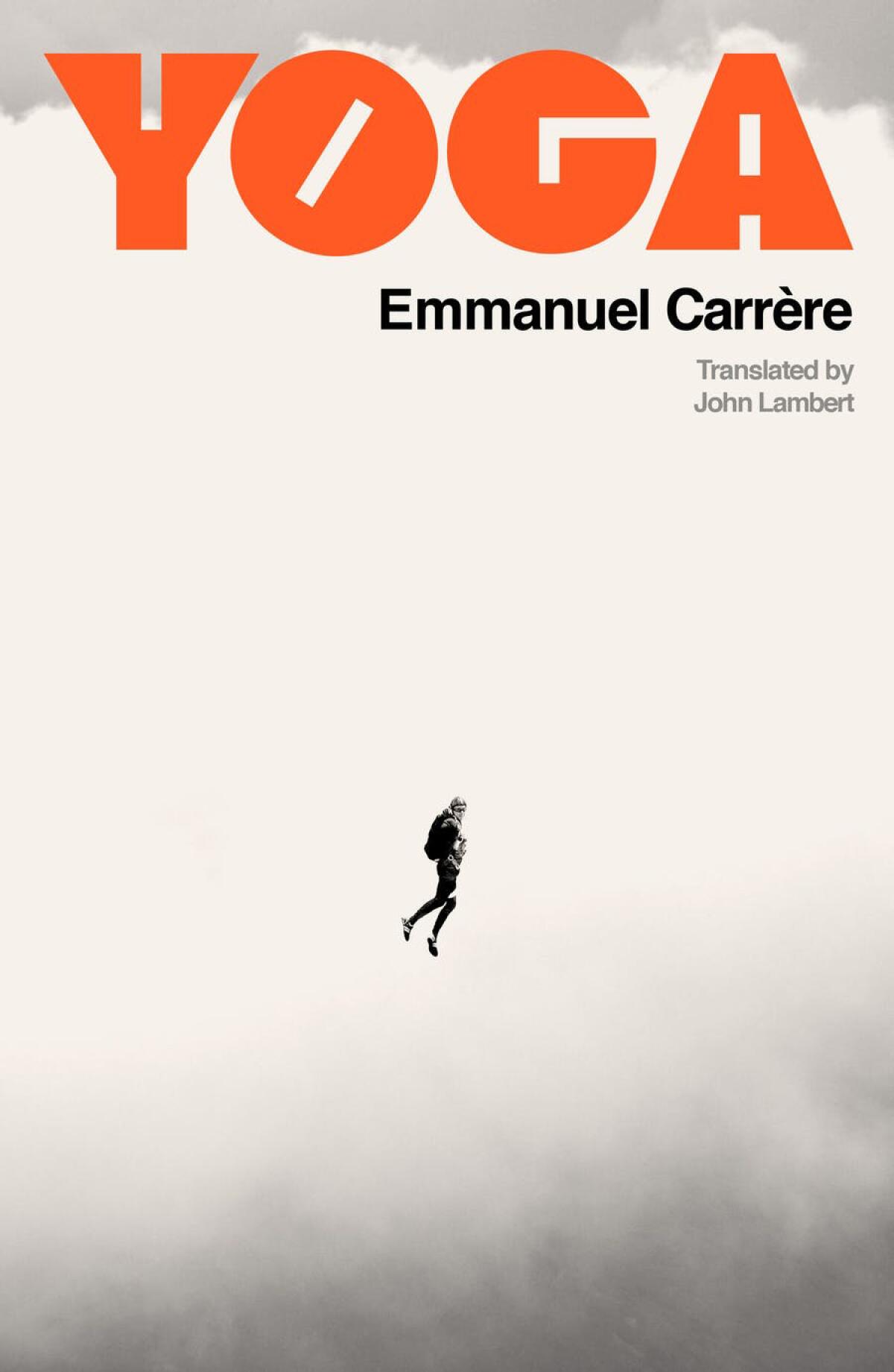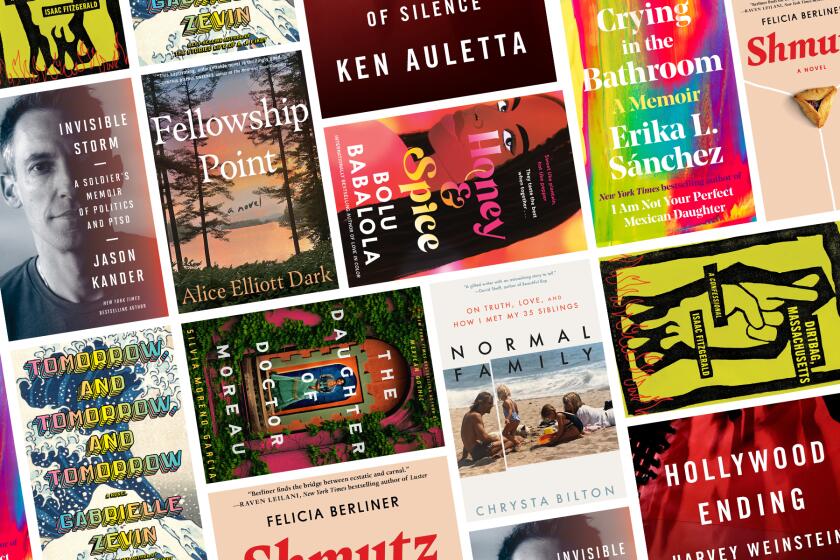Emmanuel Carrère’s new meditation memoir has an NDA-sized hole at its center

- Share via
On the Shelf
Yoga
By Emannuel Carrère
FSG: 352 pages, $28
If you buy books linked on our site, The Times may earn a commission from Bookshop.org, whose fees support independent bookstores.
After decades of meditation being hyped as a universal curative, mental and physical, there have lately been some reports about its potential psychological dangers, including episodes of dissociation and psychosis at intensive meditation retreats. So when I saw that Emmanuel Carrère’s fictionalized memoir “Yoga” would focus on how, intending to write “an upbeat, subtle little book on yoga,” the author leaves a Vipassana meditation course and ends up committed to a psychiatric hospital, I figured it was another of these indictments. But the book unexpectedly jettisons its spiritual focus, leaving no clear reason for his mental break — instead, there’s a central mystery that makes “Yoga” as profoundly engaging as it is frustrating.
When “Yoga” begins in January 2015, Carrère is one of the most famous authors in France. Though he’s “suffered several bouts of depression,” he’s had a 10-year run of good fortune and mental stability. Having given up pure fiction for spellbinding hybrids of true crime and embellished memoir, he’s happily in a second marriage and has published a string of four very successful books: “Limonov,” “My Life as a Russian Novel,” “Lives Other Than My Own” and “The Kingdom.”
Carrère has also practiced tai chi, yoga and meditation for nearly 30 years. At 59, he’s drawn to take a 10-day Vipassana course devised by S.N. Goenka, which he calls the “commando training of meditation,” as it involves more than 10 hours a day of meditation and prohibits all communication — even reading. Carrère spends about 120 delightful pages describing his unorthodox spiritual journey up to this point, including idiosyncratic definitions of meditation: “to consent to, and not run away from, things that annoy you”; “learning not to judge, in any case to judge less, a little less”; and my favorite, “everything that happens inside you during the time you remain seated, silent and motionless.”
Bethanne Patrick’s July highlights include romance, sci-fi and sacrilegious hijinks, as well as probing memoirs and a new Harvey Weinstein exposé.
Though a meditator can’t write during a course, Carrère intends to compose his yoga book in his head, holding onto thoughts rather than letting them go, and on day one he wonders whether “there’s an incompatibility, or even a contradiction, between the practice of meditation and my trade, which is to write.” On day two, Carrère has the expected physical difficulties and further doubts about the practice, falling into a hole of negative thoughts, with “unreasoned, unformulated fear” swirling in his mind, and ends up sobbing when “all the misery and sadness of the world comes crashing down on” him. I figured his crackup had begun, and he’d soon be whisked off to the hospital. But he recovers and has a good day three. Yet on day four, the administrators disturb his silence and tell him about the “Charlie Hebdo” attacks; Carrère knows one of the cartoonists murdered by the Islamic terrorists, and must attend the funeral. So he leaves the retreat and reenters the world — and a country in crisis.

A few months later, Carrère feels disappointed in himself for leaving the course incomplete; he signs up for another. Yet he glosses over this second course without much description, merely admitting he was bored, now that it was no longer mysterious and that he “cheated a bit” by taking notes. By then I was confused: If meditation didn’t cause his psychotic break, then what did? And here’s where the mystery lies. A few months after finishing the retreat, Carrère mentions he’s living alone, and though his career is at its peak, he’s lost faith in writing. His depression returns. Suddenly, he’s suffering so badly his sister makes an appointment for him at Sainte-Anne Psychiatric Hospital, where he’s diagnosed with bipolar II disorder and admitted; for four months, his only respite from craving death is provided by ketamine injections and ECT.
These chapters of his “psychiatric autobiography” are harrowing. But what triggered this breakdown? Carrère omits “the details of a crisis that is not the subject of this story.” Why? Because though he always writes honestly and “without hypocrisy” about himself, “including less flattering truths,” he says he can’t do the same about others. So something likely happened between him and his wife, but we never know what.
Though in fact, we now do: A recent New Yorker profile reported that Carrère had gotten a divorce following the retreat and then signed a contract promising not to write about his ex-wife without her permission. Eventually, he had to cut everything about her from “Yoga.” Whatever its causes in the real world, the elision in the book is an unforgivable flaw, a black hole at its center. Sometimes, what’s left unsaid creates a more interesting work; in this case it decidedly does not.
“All’s Well,” Mona Awad’s delightfully odd but strangely noncommittal new novel, concerns a woman who overcomes her ailments in Shakespearean ways.
After Carrère is discharged from the hospital, the story stagnates as its disparate parts fail to cohere. Restless at his vacation home on the Greek island of Patmos, he ferries to Leros, where he teaches creative writing to young refugees. As he befriends the retired American academic running the workshop, you begin to wonder if the hardship of the Afghan boys he teaches will bring him out of his depression — if he’ll indicate that the solution to mental suffering is to help others. But again, no; Carrère finds mental stability only through lithium.
Though “Yoga” does not suggest meditation can trigger psychological issues, it does raise the question of what meditation is for — at least in this instance — if it doesn’t shore up mental health. Yet the medicine only works if taken as prescribed; Goenka says his boot camp graduates must practice an hour in the morning and an hour in the evening. Carrère never mentions any practice at all.
Ultimately, “Yoga” shows there’s no single narrative about the connection between meditation and mental health. Some people benefit from it; others don’t. Moreover, Carrère’s narrative implies that this is the wrong question; with “Yoga,” he seems to conclude that happiness depends on factors outside our control — or at least outside our minds. At the end, when he’s sure nothing good in his life will ever happen, he falls in love again. His low shoots to a high; he feels “completely happy to be alive.” And the roller coaster sets out for another spin.
In William Brewer’s cerebral debut, ‘The Red Arrow,’ the narrator hunts for a phyicist and ponders depression and its cure, psychedelic mushrooms.
Rosenthal teaches writing at Harvard University. His work has appeared in the New York Times, the Washington Post and other publications.
More to Read
Sign up for our Book Club newsletter
Get the latest news, events and more from the Los Angeles Times Book Club, and help us get L.A. reading and talking.
You may occasionally receive promotional content from the Los Angeles Times.











